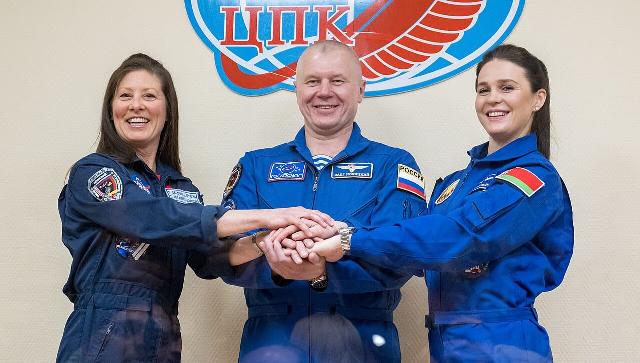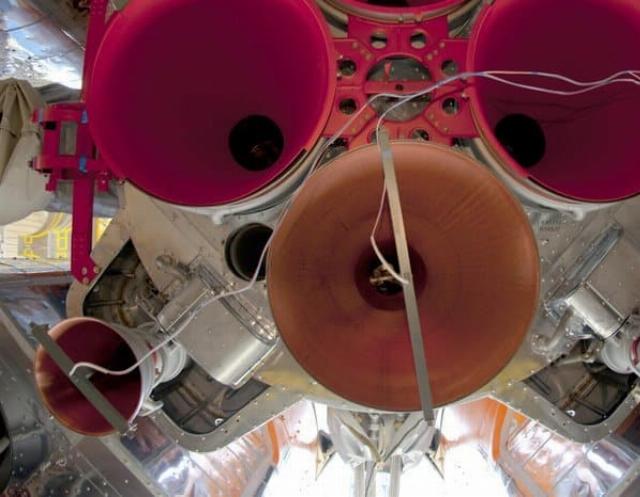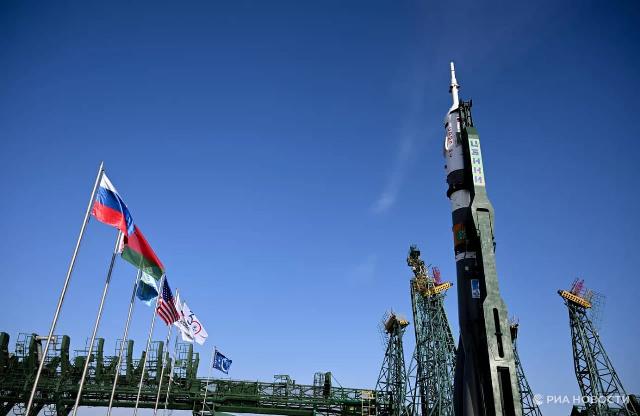On March 21, 2024, the Soyuz rocket was supposed to launch a ship with people flying to the ISS into space. However, instead, there was an automatic cancellation of the launch at the countdown stage, the first in the history of missiles of this type. For some reason, the engines did not turn on in time, which also refers to anomalies that were not previously observed in the case of this rocket (in manned flights).
At 16:21:19 Moscow time, the Soyuz-2.1a rocket was supposed to launch from Baikonur, putting the Soyuz MS-25 spacecraft into orbit. It was planned to send three people to the ISS on it — Marina Vasilevskaya, the first ever representative of Belarus in space, American Tracy Dyson and Oleg Novitsky, a Roscosmos cosmonaut. At a press conference on the occasion of the launch, the head of the Russian space agency joked, addressing the two women on board: "You keep an eye on the man there. So that he presses all the right buttons."
© Roscosmos
According to the plan, Novitsky and Vasilevskaya were supposed to spend 12 days in orbit, and Tracy Dyson — 186 days. Now it is clear that they will fly no earlier than Saturday (after about 47 hours from the delayed launch), but it is difficult to say how much this will change the total number of days in space.
Soyuz-2.1a is a carrier of the R-7 family. The initial rocket of the family was developed by Sergey Korolev, after the initial period of test flights, it was exceptionally reliable. It was only in the 2020s that the Falcon 9 rocket of the latest modification surpassed it in terms of the number of trouble-free launches in a row.

From left to right: Tracey Dyson, Oleg Novitsky, Marina Vasilevskaya. After the cancellation of the start, only the last one did not have a pulse. We can explain some of the rise in the pulse of the first two: in the history of Russian cosmonautics, the cancellation of the launch with people at the countdown stage has never happened before
Image source: NASA,Bill Ingalls
From the simultaneous broadcast of the NASA launch, it follows that about 20 seconds before the launch, the Soyuz-2.1a engines did not turn on, although the cable mast, as seen in the video, moved away from the rocket.
This is an extremely unusual event. The fact is that the engines of the R-7 family of missiles are traditionally launched by setting fire to birch sticks (there are 32 of them in total). Officially, such sticks are called a pyroburning device, they are equipped with multi-chamber oxygen-kerosene RD-107/108 engines (one stick for each combustion chamber).
It all looks like a wooden T-shaped support with a pair of pyrotechnic checkers with a spring-loaded contact between them. When the "ignition" command is given during launch, the checkers light up (ignition from electric igniters), after which the wire of the spring-loaded contact burns out, the spring unclenches the contact, and the rocket's electrical system opens the fuel supply valves.
This is an extremely reliable system in which failure can occur only for an extremely limited number of reasons. For example, a checker may not catch fire from an electric fuse. Such an incident occurred on March 12, 2016 at the launch of the Resurs-P No. 3 satellite. A day later, they tried to launch it again on the same rocket, and everything went well (this time the checker caught fire). But unlike today's incident, then it was not about manned flight.
The thoughtful and simple design of birch sticks allows you to quickly replace faulty elements of the ignition system (in a matter of hours). However, in today's case, the problem is probably not the checkers or sticks themselves.

The mentioned birch sticks are clearly visible from the bottom of the rockets of this family
Image source: Yuri Lozga
Yuri Borisov called the reason for the cancellation of the start a voltage drop of a chemical current source. Obviously, the voltage was insufficient to activate the electric plugs. Usually, it takes only a day to replace the sticks and checkers themselves, but the restart was postponed for 47 hours. This may be due to the time it takes to replace and check chemical power supplies.
Comparing with other missiles, the Soyuz ignition system, as well as the entire R-7 family, is generally rated very highly. Unlike the well-known problems with the Saturn ignition system in Apollo 6, in the case of the royal rockets, serious problems with starting the engines are extremely unlikely.
The next generations of rockets, including Russian ones, will have different ignition systems (probably laser ones), because Korolev's "birch" circuit is designed for disposable carriers and cannot be used to restart the engine, which is so necessary for reusable rockets.

